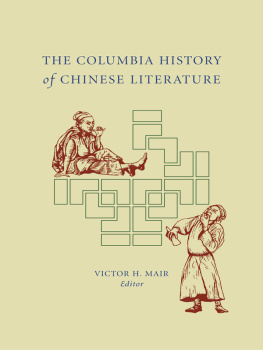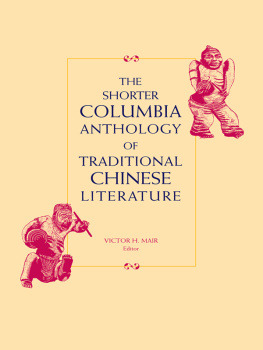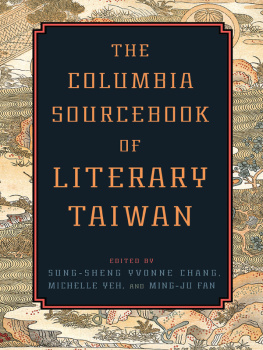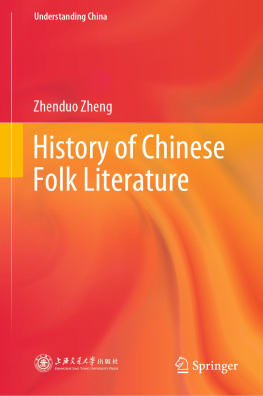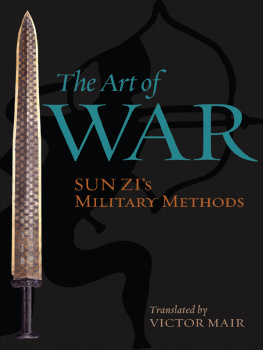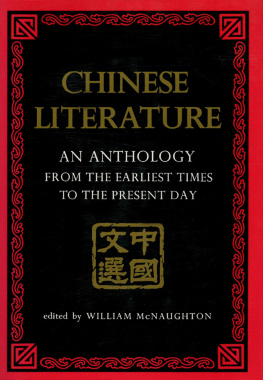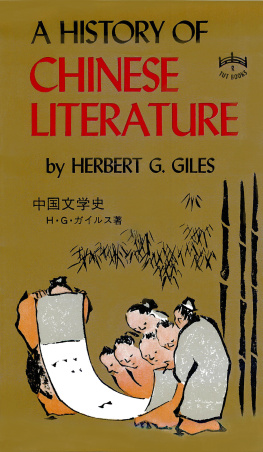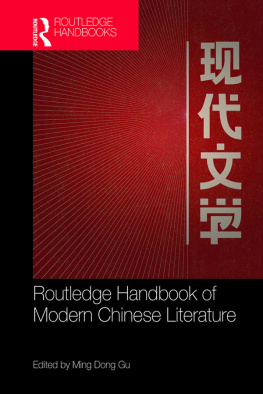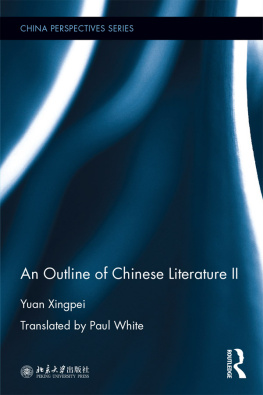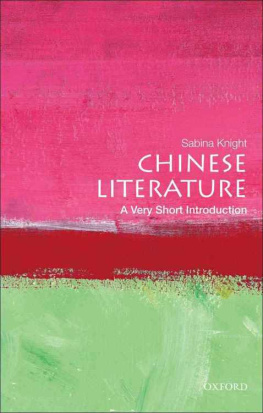The Columbia History of Chinese Literature
The Columbia History of Chinese Literature
Victor H. Mair
EDITOR

COLUMBIA UNIVERSITY PRESS
NEW YORK
Columbia University Press
Publishers Since 1893
New York Chichester, West Sussex
cup.columbia.edu
Copyright 2001 Columbia University Press
All rights reserved
E-ISBN 978-0-231-52851-1
Columbia University Press wishes to express its
appreciation for assistance given by the
Chiang Ching-kuo Foundation for International Scholarly Exchange,
the Pushkin Fund, and the
Center for East Asian Studies of the University of Pennsylvania
toward the cost of publishing this book.
Library of Congress Cataloging-in-Publication Data
The Columbia history of Chinese literature / Victor H. Mair, editor.
p. cm.
Includes bibliographical references and index.
ISBN 0-231-10984-9 (alk. paper)
1. Chinese literatureHistory and criticism. I. Mair, Victor H., 1943
PL2265.C65 2001
895.109dc21
2001028236
Cover art: Juan Chi (210263) and Sung/Chin-period actor whistling
Woodcuts by Daniel Heitkamp
A Columbia University Press E-book.
CUP would be pleased to hear about your reading experience with this e-book at .
To the people of Chinabe they Han or non-Han, be they literate or illiterate. They have all contributed, each in his or her own way, to making Chinese civilization what it is today.
CONTENTS
It was only about a century ago that the first histories of Chinese literature began to be written in any language. These earliest attempts at writing the history of Chinese literature were often little more than glorified anthologies. In many instances, they were essentially collections of translated chestnuts with scarcely any explanation or commentary. Seldom was there an attempt to construct a systematic account of the development of genres, styles, and themes or to analyze the relationship of literature to society, political institutions, or even the other arts. Around half a century later, it became possible to write general introductions to the history of Chinese literature, and several dozen of these indeed appeared in Chinese, Japanese, English, French, and German. For the most part, however, such histories were still filled largely with translations and excerpts, and offered only minimal interpretation. Of course, all the while scores of monographs and hundreds of articles were being written on various specific authors, works, movements, and periods.
In the 1960s, 1970s, 1980s, and 1990s, however, secondary studies on virtually all aspects of Chinese literature mushroomed to the point that bibliographical control became a genuine problem. Simply keeping up with the flood of new research was a challenge that occupied many specialists who compiled bibliographies, guides, and encyclopedias. The outpouring of scholarly investigations, many of them of very high quality, was both a blessing and a curse. It was a blessing because valuable insights and materials were being made available, but it was a curse because no one person could possibly stay abreast of everything that was appearing, as had been possible in the first half of the twentieth century. The superabundance of new studies proved to be so intimidating that some of the best minds in Chinese literary studies declared that it was no longer possible to write a history of Chinese literaturenot even by committee, much less by a single person. Collectively, there was simply too much known about the subject to compress it into a single volume or even into several volumes. Furthermore, it was felt that, as more was learned about the complexities of Chinese literature, it became virtually impossible to make sense of them.
Pessimism over the propriety of attempting a comprehensive history of Chinese literature also arose as a result of changing perceptions and paradigms. Whereas it used to be taken for granted that the history of Chinese literature should be chronologically divided up by dynasties and topically arranged according to genres, these once comfortable assumptions have now become subjected to such severe scrutiny that they can no longer be relied on. Critical analysis and skeptical hermeneutics have called into question even the most basic premises about Chinese literature. Periodization no longer follows a dynastic approach; traditional categories and rankings are shown to be faulty; and hitherto ignored literary realms are brought to the fore.
Despite these daunting obstacles to the creation of a viable history of Chinese literature for our time, the need for such a work is so compelling that we have gone forward, fully aware of the difficulties. What The Columbia History of Chinese Literature attempts to do is to weave together the latest findings of critical scholarship in a framework that is simultaneously chronological and topical. The chronology used here is far from strictly dynastic, but it does not eschew dynastic divisions altogether when they are warranted. As for topics covered, this volume by no means subscribes to the view that Chinese literature can be neatly broken up according to traditional genres. Since many of the old genre categories are problematic, they are referred to but not regarded as restrictions. Above all, the history of Chinese literature is seen through entirely new prisms that transcend both time and genre. These unaccustomed lenses for looking at Chinese literature may be found in a number of specific chapters (e.g., ), but are also spread throughout the book.
The scope of this work is the entire history of Chinese literature from its inception to the present day. Most attention is naturally devoted to the premodern period, because it is so vast by itself and because postimperial (after 1911) literature in China has increasingly become international, in both themes and form. By the same token, however, the twentieth century is covered to show the extent to which traditions persist and the degree to which they have changed. The primary aim throughout this volume is to illuminate essential features of the history of Chinese literature so that those who are completely unacquainted with it will be able to gain a foothold, and so that those who are minimally acquainted with the subject as a whole or who are familiar with one facet of it will gain a deeper understanding and a more comprehensive grasp.
Some of the issues and themes that run throughout the volume can be enumerated here. A primary concern is with the way that thought (broadly construed) and religion have conditioned the growth of literature. Confucianism, Buddhism, Taoism, and folk religion have all played decisive roles in the unfolding of literature in China. The permutations and combinations of these various strands of Chinese secular and sacred discourse are extraordinarily complicated, yet coming to grips with them is essential for an accurate and adequate understanding of Chinese literature. This work also endeavors to clarify the importance of the relationship between the elite and the popular for Chinese literature, by no means a simple task. Similarly, a special effort has been made to account for the intricate interaction between the Han (Sinitic) and non-Han (non-Sinitic) as it is manifested in literary works that have survived. Linked to this is a serious examination of the role of language (both literary and vernacular) in determining the nature of particular texts. This, in turn, leads to the matter of written versus oral, and national versus regional and local, in the Chinese literary landscape.
In general, Chinese literature is seen here as intimately associated with the society in which it was nurtured and manifested. Literature is not a thing unto itself but, rather, the product of an infinite array of sociopolitical forces and cultural factors. In each chapter, the purpose is to illuminate as many of these interconnections as possible. Obviously, it would be impossible to mention every author and every work written in the long history of Chinese literature. Instead, representative figures and titles have been selected, in an effort not to miss anything essential; yet we also introduce some authors and works that have hitherto been ignored for one reason or another despite their significance. Although the volume aims to be comprehensive, it would be folly to believe it could be exhaustive. For a history of literature to be genuine, it is more important for it to be enlightening than to be all-inclusive. Therefore, this history touches on such matters as the fuzzy interface between prose and poetry, the uncertain boundary between fiction and drama, and the ineffable interplay between spoken and written language. In the end, what this history has helped the contributors to seeand what we hope it helps our readers to seeis the varied nature of Chinese literature, its shifting contours and kaleidoscopic transformations, its subtle lineaments and lasting verities. If, on the completion of this volume, one can say anything with conviction about the history of Chinese literature, perhaps it would be that it is long, abundant, and vibrant. May some such recognition stand as a much-needed corrective to customary notions of Chinese literature as effete, exotic, and monotonous. Quite the contrary, the history of Chinese literature is as multifarious and vital as that of any other literary tradition on earth.
Next page
